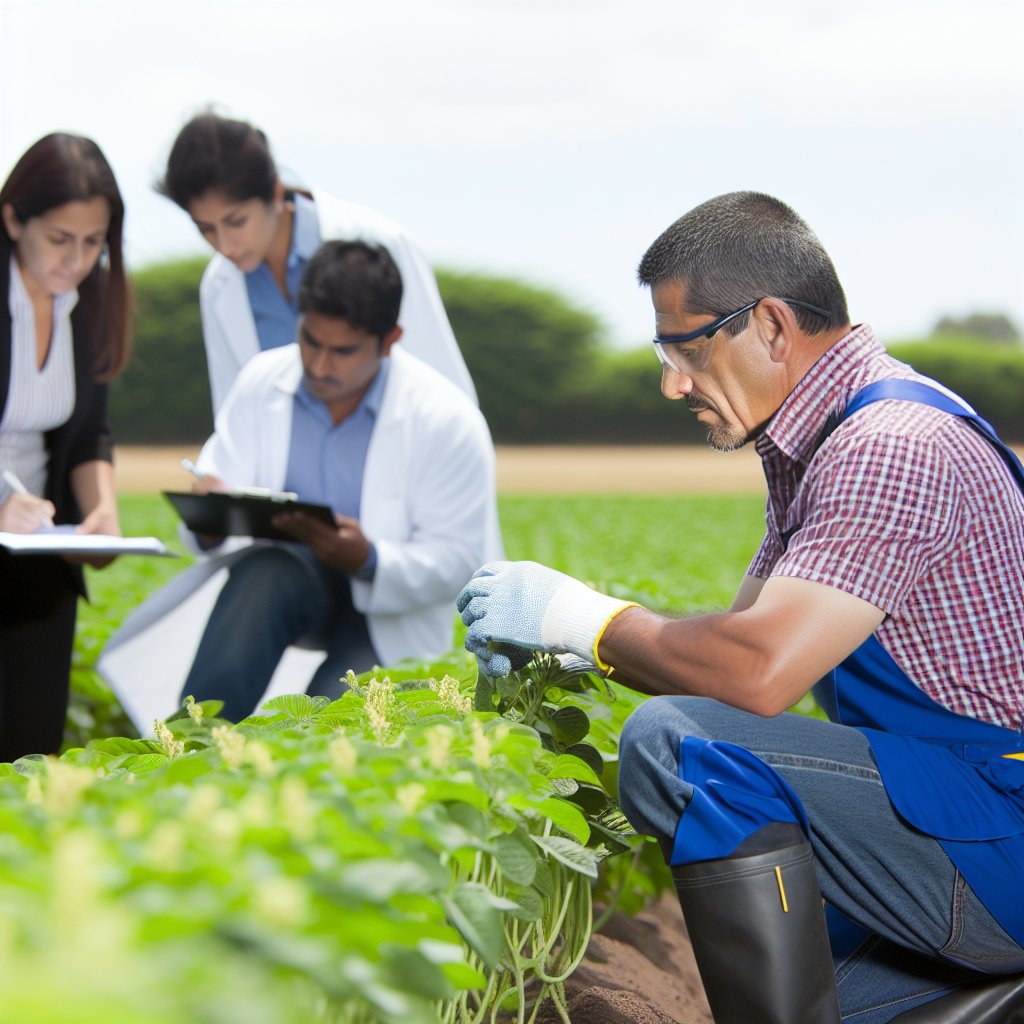Introduction
Agricultural technicians play a crucial role in supporting scientists in their research and development efforts.
Role of Agricultural Technicians
Agricultural technicians help scientists by conducting experiments, collecting data, and analyzing results.
Importance of Their Work
Their work is vital in advancing agricultural research, improving crop yields, and developing sustainable farming practices.
Education and Training Requirements for Agricultural Technicians:
- Associate’s degree or completion of a vocational program
- Specialized training in agricultural science and technology
- Importance of hands-on experience in the field
When it comes to becoming an agricultural technician, there are specific education and training requirements that individuals must meet in order to excel in this field.
While there are various paths one can take to become an agricultural technician, some common requirements include obtaining an associate’s degree, completing a vocational program, undergoing specialized training in agricultural science and technology, and gaining hands-on experience in the field.
Associate’s Degree or Completion of a Vocational Program
One of the main educational requirements for agricultural technicians is the completion of an associate’s degree or a vocational program related to agriculture.
These programs provide students with a solid foundation in agricultural science, technology, and practices that are essential for success in the field.
Whether it’s learning about soil composition, plant physiology, pest management, or crop production, obtaining an associate’s degree or completing a vocational program equips individuals with the necessary knowledge and skills to thrive as agricultural technicians.
Specialized Training in Agricultural Science and Technology
In addition to obtaining a degree or completing a vocational program, agricultural technicians also need specialized training in agricultural science and technology.
This training allows them to gain a deeper understanding of the latest advancements in agriculture, including innovative farming techniques, precision agriculture technologies, and sustainable practices.
By staying abreast of these developments, agricultural technicians can better assist scientists in conducting research, analyzing data, and implementing new strategies to improve crop yield and overall agricultural productivity.
Importance of Hands-on Experience in the Field
While education and training are essential for becoming an agricultural technician, hands-on experience in the field is equally important.
Being able to apply theoretical knowledge to real-world agricultural settings allows technicians to troubleshoot problems, make informed decisions, and collaborate effectively with scientists on research projects.
Whether it’s conducting soil tests, monitoring crop growth, or collecting samples for analysis, hands-on experience provides valuable insight into the day-to-day challenges and opportunities that exist within the agricultural industry.
Duties and Responsibilities of Agricultural Technicians
Assisting scientists in conducting experiments and collecting data.
Maintaining laboratory equipment and ensuring its proper functioning.
Analyzing samples and recording observations for further analysis.
One of the primary roles of agricultural technicians is to assist scientists in conducting experiments and collecting data.
This involves preparing materials, setting up equipment, and following strict protocols to ensure accurate results.
By working closely with scientists, agricultural technicians play a crucial role in the research process and help to facilitate the advancement of agricultural science.
Transform Your Career Today
Unlock a personalized career strategy that drives real results. Get tailored advice and a roadmap designed just for you.
Start NowIn addition to assisting with experiments, agricultural technicians are also responsible for maintaining laboratory equipment.
This includes cleaning and calibrating instruments, as well as troubleshooting any technical issues that may arise.
By ensuring that equipment is properly functioning, technicians help to prevent errors and ensure the accuracy of experimental results.
Another key responsibility of agricultural technicians is to analyze samples and record observations for further analysis.
This involves carefully examining samples under a microscope, conducting tests to detect specific compounds, and documenting findings in detail.
By recording observations accurately, technicians contribute valuable data that can be used to draw conclusions and make recommendations for future research.
The duties and responsibilities of agricultural technicians are essential to the success of scientific research in the field of agriculture.
Through their hard work and attention to detail, technicians play a vital role in advancing our understanding of agricultural practices and developing innovative solutions to address challenges facing the industry.
Explore Further: 4-H Youth Agents: Connecting Youth to Agriculture
Collaboration with scientists in research projects
Agricultural technicians play a crucial role in research projects by collaborating with scientists.
They work closely with researchers to achieve project goals.
Providing essential support in various aspects of the research process is their responsibility.
One key way agricultural technicians assist scientists is by helping with field trials and experiments.
They are responsible for setting up experiments, collecting data, and ensuring that all protocols are followed accurately.
Their attention to detail and precision are essential in ensuring the reliability of research results.
Additionally, agricultural technicians play a vital role in data analysis and interpretation.
After data collection, technicians assist scientists in analyzing the data using specialized software and techniques.
They help identify trends, patterns, and correlations that are essential for drawing meaningful conclusions from the research.
Moreover, agricultural technicians contribute to scientific publications by providing valuable insights and interpretations of the data.
Showcase Your Business Today
Reach thousands of readers actively exploring professional services. Publish your business profile and grow your audience now.
Publish NowThey collaborate with scientists to draft reports, papers, and presentations that communicate research findings to the scientific community.
Their input is critical in ensuring the accuracy and clarity of the research results.
Learn More: Agricultural Loan Officer Interview Preparation
Utilization of Technology in Agricultural Research
In today’s rapidly evolving world, agricultural technicians play a crucial role in assisting scientists with their research endeavors.
One of the ways they contribute is through the use of technology.
Utilizing Advanced Tools and Equipment for Data Collection and Analysis
Agricultural technicians are proficient in operating a variety of advanced tools and equipment used for data collection and analysis.
These tools include drones, satellite imaging, soil sensors, and weather stations.
By utilizing these tools, technicians can collect accurate and real-time data that is essential for scientific research.
They are also skilled in software programs that help in processing and analyzing the collected data.
By using these tools and equipment, agricultural technicians assist scientists in obtaining valuable insights into crop performance, soil health, and environmental factors that impact agricultural practices.
Knowledge of Precision Agriculture Techniques for Maximizing Crop Yield
Agricultural technicians possess a deep understanding of precision agriculture techniques that are designed to maximize crop yield while minimizing resource inputs.
They work closely with scientists to implement these techniques in the field and monitor their effectiveness.
Precision agriculture involves the use of GPS technology, sensors, and automated machinery to optimize planting, irrigation, and fertilization practices.
Agricultural technicians play a key role in ensuring that these techniques are correctly applied and adjusted based on data analysis.
Implementing Digital Solutions for Monitoring and Managing Agricultural Practices
In addition to using advanced tools and precision agriculture techniques, agricultural technicians are adept at implementing digital solutions for monitoring and managing agricultural practices.
They utilize farm management software, data analytics platforms, and mobile applications to streamline workflows and increase efficiency.
These digital solutions enable technicians to track crop growth, monitor pest populations, and analyze production trends.
By leveraging technology, agricultural technicians assist scientists in making data-driven decisions that enhance productivity and sustainability in agriculture.
Overall, the use of technology in agricultural research is critical for advancing scientific knowledge and improving agricultural practices.
Agricultural technicians play a vital role in harnessing the power of technology to support scientists in their research efforts and drive innovation in the field of agriculture.
Learn More: How to Start a Career in Animal Nutrition
Importance of communication skills in working with scientists
Communication skills are vital for agricultural technicians when working alongside scientists.
They play a crucial role in ensuring that research projects run smoothly and that results are accurately documented and analyzed.
- Collaborating effectively with researchers and other team members
- Providing clear and concise reports on research findings
- Communicating experimental procedures and results to ensure accuracy and reliability
One of the primary responsibilities of agricultural technicians is to collaborate with scientists and other team members.
This collaboration requires strong communication skills to ensure that everyone is on the same page and working towards the same goals.
By effectively communicating ideas, progress, and challenges, agricultural technicians can contribute to the success of research projects.
They must be able to clearly express their thoughts and provide valuable input during discussions and decision-making processes.
Additionally, strong communication skills help agricultural technicians build rapport with researchers, fostering a positive and productive working relationship.
Clear and open communication creates a supportive environment where all team members feel heard and valued.
Another crucial aspect of communication for agricultural technicians is the ability to create clear and concise reports on research findings.
These reports are essential for documenting the progress of experiments, analyzing results, and drawing meaningful conclusions.
Effective communication skills are needed to accurately convey complex scientific information in a concise and understandable format.
Agricultural technicians must be able to organize data, interpret results, and communicate their findings in a way that is accessible to a diverse audience.
By providing clear and detailed reports, agricultural technicians help scientists make informed decisions, refine research methodologies, and advance the understanding of agricultural processes and technologies.
Communicating experimental procedures and results is critical for ensuring the accuracy and reliability of research outcomes.
Agricultural technicians must be able to explain protocols, methodologies, and results to ensure consistency and reproducibility.
Clear communication helps to minimize errors and discrepancies in research data, enabling scientists to confirm the validity of findings and draw reliable conclusions.
Agricultural technicians play a key role in maintaining the integrity of research projects by providing accurate and detailed information.
By communicating effectively, agricultural technicians contribute to the overall success of scientific research.
They ensure that experiments are conducted correctly, data is recorded accurately, and results are interpreted effectively.
Showcase Your Business Today
Reach thousands of readers actively exploring professional services. Publish your business profile and grow your audience now.
Publish NowTheir ability to convey information clearly and concisely is essential for facilitating collaboration, promoting transparency, and advancing knowledge in the field of agriculture.
Uncover the Details: Extension Agent Workshops for Home Gardeners

Career Opportunities for Agricultural Technicians
When it comes to career opportunities and growth potential for agricultural technicians, there are several avenues to explore.
Let’s take a closer look at how individuals in this field can progress and advance in their careers.
Job Prospects in Research Institutions, Government Agencies, and Private Companies
Agricultural technicians play a crucial role in various settings, including research institutions, government agencies, and private companies.
These organizations rely on technicians to assist scientists in conducting experiments, collecting data, and analyzing results.
Research institutions often employ agricultural technicians to support ongoing research projects in areas such as crop science, soil science, animal science, and agricultural engineering.
Technicians work closely with scientists and researchers to ensure that experiments are carried out effectively and accurately.
Government agencies, such as the Department of Agriculture, also hire agricultural technicians.
They help monitor and analyze agricultural practices, enforce regulations, and provide technical assistance to farmers.
Technicians may conduct field visits, take soil samples, and assist in the development of agricultural policies and programs.
Private companies in the agricultural sector, including agribusinesses, seed companies, and food processing companies, also offer job opportunities for agricultural technicians.
These companies often hire technicians to assist in product development, quality control, and research and development efforts.
Opportunities for Advancement with Experience and Additional Training
As agricultural technicians gain experience and develop their skills, they have opportunities for advancement within their field.
Technicians demonstrating strong technical abilities and attention to detail may be promoted to senior technician or supervisory roles.
Pursuing additional training and certification can help agricultural technicians enhance their knowledge and skills.
This makes them more competitive in the job market.
Many technicians choose to pursue advanced degrees in agricultural science, agricultural technology, or related fields to expand their expertise.
By staying current with the latest developments in agricultural technology and techniques, technicians can position themselves for leadership roles.
Continuous learning and professional development are key to advancing in this dynamic and evolving field.
Potential for Specialization in Specific Areas of Agricultural Science
One of the key advantages of a career as an agricultural technician is the potential for specialization in specific areas of agricultural science.
Technicians can choose to focus their work on a particular aspect of agriculture, such as plant breeding, pest management, soil conservation, or precision agriculture.
Specializing in a niche area allows technicians to develop expertise and become subject matter experts in their chosen field.
This specialization can open up new opportunities for career advancement.
It also provides the chance to work on cutting-edge research projects and collaborate with leading scientists and researchers.
By honing their skills and knowledge in a specific area, technicians can differentiate themselves in the job market.
This can lead to higher-paying and more rewarding positions.
Specialization also allows technicians to make a significant impact in their chosen field and contribute to the advancement of agricultural science as a whole.
When it comes to advancing agricultural science, agricultural technicians play a crucial role in assisting scientists.
Their contribution goes beyond just assisting in research projects.
They help develop new farming techniques and technologies.
They improve crop production efficiency and sustainability.
They enhance the overall agricultural industry through research and innovation.
Contributing to the Development of New Farming Techniques and Technologies
Agricultural technicians work closely with scientists in conducting experiments and trials.
They test new farming techniques and technologies.
They provide valuable support by collecting data and analyzing results.
They assist in the development of prototypes.
With their hands-on approach, they help scientists refine their ideas.
They bring those ideas to fruition.
Improving Crop Production Efficiency and Sustainability
By working side by side with scientists, agricultural technicians help improve crop production efficiency.
Showcase Your Business Today
Reach thousands of readers actively exploring professional services. Publish your business profile and grow your audience now.
Publish NowThey assist in optimizing planting techniques.
They monitor soil health.
They implement precision agriculture practices.
Through their efforts, they contribute to the development of sustainable farming practices.
These practices have a positive impact on the environment.
Enhancing the Overall Agricultural Industry Through Research and Innovation
In collaboration with scientists, agricultural technicians play a key role in conducting research.
They develop innovative solutions for the agricultural industry.
They assist in testing new pesticides, fertilizers, and crop varieties.
They evaluate new agricultural equipment and machinery.
Their contributions help drive innovation and progress in the field of agriculture.
Agricultural technicians are essential partners in advancing agricultural science.
Their hands-on assistance and support enable scientists to conduct research.
They help develop new technologies and innovate in the agricultural industry.
Without their contributions, progress and growth in agriculture would be significantly limited.
As we continue to face challenges such as climate change and food security, the role of agricultural technicians will only grow.
They will be more critical in driving advancements in the field.
Agricultural Technicians and Their Impact
Agricultural technicians play a crucial role in assisting scientists in various research projects.
Their hands-on skills and knowledge help scientists in collecting data.
They also conduct tests and monitor agricultural processes efficiently.
By working closely with scientists, agricultural technicians contribute significantly to the advancement of agricultural research.
They help in discovering new techniques, improving crop yield, and finding sustainable solutions.
These contributions address agricultural challenges effectively.
Agricultural technicians are instrumental in bridging the gap between scientific theories and practical applications.
Their dedication and expertise benefit the agriculture industry greatly.
Moreover, they contribute to feeding the growing global population.
Additional Resources
Agricultural Technician II Research – Garden City, Kansas, United …
[E-Books for Sale]
The Big Book of 500 High-Paying Jobs in America: Unlock Your Earning Potential
$19.99 • 500 High-Paying Jobs • 330 pages
Explore 500 high-paying jobs in America and learn how to boost your career, earn more, and achieve success!
See All 500 High-Paying Jobs of this E-Book
1001 Professions Without a Degree: High-Paying American Jobs You Can Start Now
$19.99 • 1001 Professions Without a Degree • 174 pages
Discover 1001 high-paying jobs without a degree! Unlock career tips, skills, and success strategies for just $19.99!




